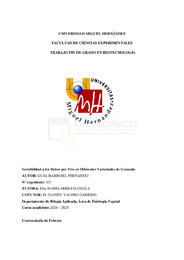Por favor, use este identificador para citar o enlazar este ítem:
https://hdl.handle.net/11000/36214Registro completo de metadatos
| Campo DC | Valor | Lengua/Idioma |
|---|---|---|
| dc.contributor.advisor | Serrano Mula, María | - |
| dc.contributor.advisor | Valero Garrido, Daniel | - |
| dc.contributor.author | Gual Barroso, Fernando | - |
| dc.contributor.other | Departamentos de la UMH::Biología Aplicada | es_ES |
| dc.date.accessioned | 2025-03-28T10:34:00Z | - |
| dc.date.available | 2025-03-28T10:34:00Z | - |
| dc.date.created | 2024 | - |
| dc.identifier.uri | https://hdl.handle.net/11000/36214 | - |
| dc.description.abstract | Este trabajo evalúa la susceptibilidad al daño por frío (chilling injury, CI) en ocho cultivares de granada (Punica granatum L.) almacenados en condiciones refrigeradas. Se observaron diferencias significativas entre las variedades, siendo Mollar de Elche, Mollar-100 y Purple Queen las más tolerantes, mientras que Wonderful, Bigful y Kingdom mostraron mayor sensibilidad. Los índices de CI se relacionaron directamente con la fuga de electrolitos (Ion Leakage, IL), confirmando que este parámetro es un indicador clave de la integridad de las membranas celulares. Sin embargo, no se halló correlación entre los índices de CI y el contenido de fenoles totales o la actividad de polifenoloxidasa (PPO). Por tanto, la diferente sensibilidad de las variedades de granada al CI no se debe a su contenido en fenoles o a la diferente actividad PPO, sino que podría deberse al mejor mantenimiento de la estructura y funcionalidad de las membranas celulares, posiblemente por su mayor contenido en ácidos grasos insaturados, lo que requiere futuras investigaciones. | es_ES |
| dc.description.abstract | This study evaluates the susceptibility to chilling injury (CI) in eight cultivars of pomegranate (Punica granatum L.) stored under refrigerated conditions. Significant differences were observed among varieties, with Mollar de Elche, Mollar-100 and Purple Queen demonstrating the highest tolerance, while Wonderful, Bigful and Kingdom exhibited higher sensitivity. The investigation established a direct correlation between CI indices and Ion Leakage (IL), thereby confirming the latter as a key indicator of cell membrane integrity. However, no correlation was found between IQ indices and total phenol content or polyphenol oxidase (PPO) activity. Therefore, the different sensitivity of pomegranate varieties to CI is not due to their phenol content or different PPO activity but could be due to the better maintenance of the structure and functionality of cell membranes, possibly due to their higher content of unsaturated fatty acids, which requires future research. | es_ES |
| dc.format | application/pdf | es_ES |
| dc.format.extent | 24 | es_ES |
| dc.language.iso | spa | es_ES |
| dc.publisher | Universidad Miguel Hernández | es_ES |
| dc.rights | info:eu-repo/semantics/openAccess | es_ES |
| dc.rights | Attribution-NonCommercial-NoDerivatives 4.0 Internacional | * |
| dc.rights.uri | http://creativecommons.org/licenses/by-nc-nd/4.0/ | * |
| dc.subject | Almacenamiento | es_ES |
| dc.subject | Calidad | es_ES |
| dc.subject | Daño por Frío | es_ES |
| dc.subject | Fenoles totales | es_ES |
| dc.subject | Fuga de electrolitos | es_ES |
| dc.subject | Punica granatum. | es_ES |
| dc.subject | Chilling Injury | es_ES |
| dc.subject | Ion Leakage | es_ES |
| dc.subject | Punica granatum | es_ES |
| dc.subject | Quality, Storage | es_ES |
| dc.subject | Total Phenols | es_ES |
| dc.subject.other | CDU::5 - Ciencias puras y naturales::57 - Biología | es_ES |
| dc.title | Sensibilidad a los Daños por Frío en Diferentes Variedades de Granada | es_ES |
| dc.type | info:eu-repo/semantics/bachelorThesis | es_ES |

Ver/Abrir:
TFG - Gual Barroso, Fernando.pdf
751,42 kB
Adobe PDF
Compartir:
 La licencia se describe como: Atribución-NonComercial-NoDerivada 4.0 Internacional.
La licencia se describe como: Atribución-NonComercial-NoDerivada 4.0 Internacional.
.png)